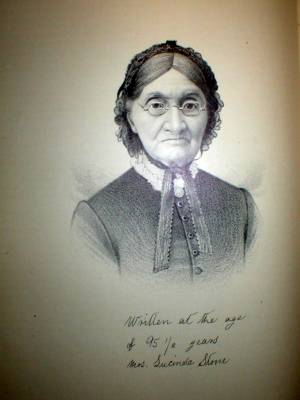|
Source: "Portrait and Biographical Record - Published 1894 by Excelsior Publishing Co., Chicago" Pages 449 - 450

Mrs. Lucinda Stone well deserves mention among the honored pioneers of this county. She is, without doubt, the
oldest living citizen within its borders, and the "Queen of the Pioneers of Sheboygan County." She was born February
20, 1798, in Windsor County, Vt., her parents being William and Priscilla (Hoadley) Danforth, Her father, who was
born in Massachusetts, July 23, 1761, served as a soldier of the Revolutionary War, and was acquainted with Gen.
Washington. His life work was that of a farmer, and he was a member of the Methodist Episcopal Church. His wife was
born in Cambridge, Mass., March 19, 1762, and could well remember when Gen. Gage landed at Charlestown. She was an
eye-witness of the famous Boston "Tea Party."
Mrs. Stone spent the days of her maidenhood in the Green Mountain State, and in her early years taught school,
being a lady of more than ordinary ability. On the 27th of December, 1818, she became the wife of James Stone, and
eight children were born unto them, two sons and six daughters, of whom the following are now living: Elmina, wife
of Sherman Cummings, a millwright of Rockford, Ill.; Glanville W., a farmer of Martin County, Minn.; Mrs. Elijah
Andrus, whose sketch appears elsewhere in this work; Mrs. Selden Aiken, who is also represented on another page; H.
H., a manufacturer of Rockford, Ill.; and Mary, wife of Henry McMurphy, a prosperous farmer of Lyndon Township.
In 1846, Mr. and Mrs. Stone determined to seek a home in the West, and, packing up their household effects, started
for the Territory of Wisconsin on the 10th of September, making the trip by canal to Syracuse, and thence by the
Lakes to Sheboygan, which was then a mere hamlet, in which stumps were more plentiful than houses. Mr. Stone
purchased eighty-eight acres of Government land at $1.25 per acre. Their first home was a log cabin, 16x20 feet,
the floor of rough hewn boards, with a hole in the roof through which the smoke escaped. They made their own
furniture, and had to resort to many odd devices in the house and farm work. There were ninety families of Indians
near by, and the red men were great beggars.
During the first winter spent in Wisconsin by the Stone family, Miss Helen kept school in the district of Samuel
Reed, and came home every Saturday night, remaining until Sunday night. It was the last of December, and no snow
had fallen. Helen came home as usual, and when it began to snow on Sunday after dinner, she said to her mother, "I
must start now, or I shall not be able to see the marks on the trees," for they were the only means by which she
was guided on her way to the home where she was to board that week. Her mother suggested that if she must go, she
had better put on Helmer's thin boots, which she did, carrying her shoes in her hands. She had not gone far when
she discovered that she had lost her way, and so dark was the night that she could not see to retrace her steps,
though the snow-storm had ceased. As she wandered, she kept walking faster and faster, fearing lest she should be
compelled to remain out all night. Having tramped many weary miles, she caught sight of a spark of fire, and,
hurrying toward it, found to her great joy that it was a lighted candle in the house of Samuel Reed, with whom she
had boarded the week before. During the six hours that she had tramped through the woods, her clothing had become
thoroughly soaked, but at the home of that hospitable pioneer her wants were provided for. It should be stated that
through all this excitement she clung to her shoes.
After living here for about a year, Mrs. Stone concluded to write home and tell her people of her pioneer life, but
she found that she had no pen. Necessity, however, is the mother of invention, and walking out into the yard she
found the quill of some bird and hastened back to make her pen. She had to sharpen the quill with the butcher
knife, and her ink was made of copperas and maple bark, and her writing-desk a peck measure turned upside down. The
letter, however, reached its destination, and was taken by her sister to the prayer-meeting, where it was read to
her many Eastern friends. Hospitality reigned in those days, and though the ladies dressed in calico gowns and
sun-bonnets, and their husbands in homespun, they yet enjoyed life with that zest which makes a pleasure all the
more enjoyable for the work that has gone before.
Mr. Stone was instrumental in establishing the first postoffice in Lyndon Township, which was called Winooski, and
he served as Postmaster for eight years. The first district school was established in the northern part of the
township, and was taught by Helen Stone. In church work, Mr. and Mrs. Stone took a prominent part, and were known
throughout the county for their benevolence. His death occurred April 14, 1857, since which time Mrs. Stone has
lived with her daughter, Mrs. Aiken. For over half a century she has been a faithful and devoted member of the
Methodist Episcopal Church. Without regret she can look back over her past and forward to the future without fear,
as her life has been full of good words and works, and her exemplary Christian character has won her the love and
esteem of all with whom she has been brought in contact. She is now passing her last days quietly in the home of
her daughter, where she is surrounded by loving care and attention.
Copyright 1997 - 2009 by Debie Blindauer
All Rights